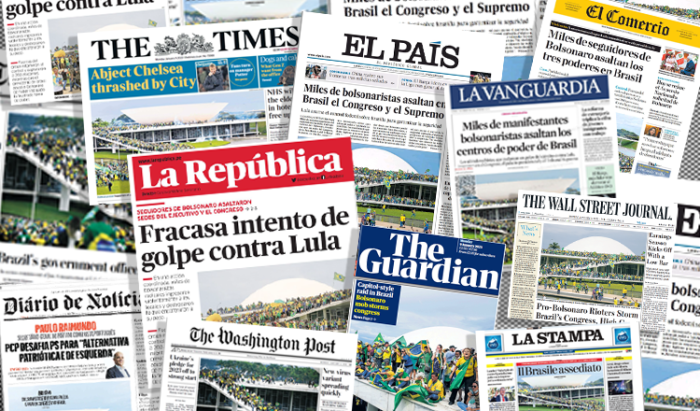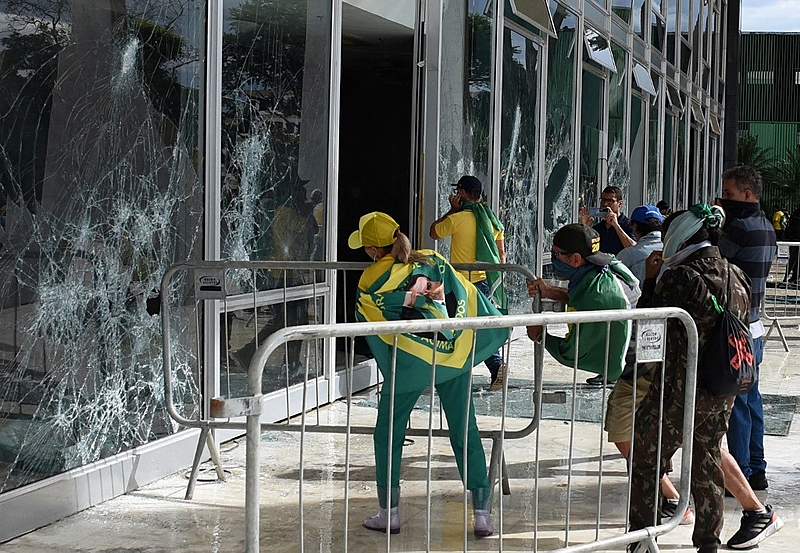January 10 2023: A week ago Brasilia was the scene of joyful celebrations of the new Lula government. But on Sunday 8 January came a violent reminder that many of Bolsonaro’s millions of supporters, far from accepting his defeat, want to overthrow the elected government and provoke military intervention in the country.
Thousands of Bolsonarista terrorists rampaged undisturbed for hours through the capital’s three seats of power, the Congress, the Supreme Court and the Presidential Palace, vandalizing everything in sight. They smashed scores of plate glass windows, hurled furniture outside, ransacked files and stole objects of value, including gifts from foreign governments, computers, documents, and guns and ammunition from the security department. They slashed a painting worth millions of dollars by one of Brazil’s most famous painters, Di Cavalcanti, irreparably damaged a priceless eighteenth-century clock given to the royal family by Louis XIV, smashed every photo in the gallery containing those of every Brazilian president since the beginning of the republic in 1889, and destroyed every object in the office of the first lady, Janja.
They only failed to break into the president’s office because it was protected by an armoured door. In the Supreme Court they trashed the judges’ chairs in the main court room where plenary sessions take place, stole judges’ togas, and ripped the coat of arms from the wall. In the congress they invaded the Senate and smashed glass doors. Several of them urinated and defecated on works of art. The irony of chanting ‘Lula ladrao, seu lugar é na prisão’ (‘Lula thief, your place is in jail’) as they stole objects, seems to have been lost on them. At least eight journalists, both Brazilian and foreign, were attacked and some had their equipment stolen.
The threat from the military
The Brasilia police and the two army battalions of palace guards were nowhere to be seen. The invaders, who had arrived in hundreds of buses from all over Brazil the day before, not only were allowed to march down the main Esplanade of Ministries to the Three Powers square, but they were actually escorted by police on the way. The special Congress police force, armed with riot shields, waved them on.
It became clear that the new government had seriously underestimated the reality of the threat, which had been openly declared in social media messages, and also failed to realise the extent of support for Bolsonaro in the local government, beginning with the governor of the federal district himself, who had insisted on appointing Bolsonaro’s Minister of Justice, Anderson Torres, a federal police officer, as his police chief. Where was Torres when Brasilia was being taken over by hordes of extremists? In Miami, where Jair Bolsonaro has taken up residence.
The aim of the invasion was to occupy the three institutions which symbolize power, supported by sectors of the police and the armed forces. So sure were the Bolsonarista vandals that they would triumph, they posted videos of themselves wrecking and smashing the installations.
The Lula government had been warned by security specialists that many members of the police forces and the intelligence agencies were supporters of the ex-president, but they underestimated the chances of a violent insurrection, relying on flawed intelligence. ABIN, the national intelligence agency, whose constitutional function is the defence of the nation’s security, had become instead an agency dedicated to protecting Bolsonaro and his sons from accusations of corruption.
Vandalism provokes outrage
It took several hours before there was a reaction, sparked by outrage at what was happening. Brasilia was placed under federal intervention, and the police finally moved in and detained 300 people. Questioned, some of them said they had been paid to come to Brasilia and given free bus tickets. Others seem to have really believed that the election was stolen and Lula has no right to be president.
The next morning police and army officers cleared the impromptu camps set up by Bolsonaro supporters outside military barracks in many states. In Brasilia 1,200 people at the camp, many of whom had taken part in the invasions the day before, were detained. Among the inhabitants of the camp there were many retired military officers.
Disinformation campaigns, including Bolsonaro’s permanent attempts to undermine the electoral system, querying the reliability of the electronic voting machines, attacking the Electoral court, deliberately aim to create a confusing and disorientating situation where it is difficult for many to separate the truth from the lies.
It is only a radical minority who practice vandalism and attacks on democracy, but they are part of a much larger movement, which appeals to values profoundly rooted in the more conservative sectors of Brazilian society like machismo, racism, militarism.
The backlash
But the shocking scenes in Brasilia were rejected by the majority of the population. For some, Sunday’s violence showed that Bolsonarism is not a political movement, but a terrorist organization.
Analysts say that Lula will have to reform all the security forces, purging them of radical Bolsonarista supporters, who are by extension anti-democratic agents. Under the previous government their constitutional roles were distorted or destroyed. Rebuilding them into forces that defend democracy instead of attacking it, is now necessary.
For historian Manuel Domingo Neto what happened on Sunday was pure vandalism, aimed at putting an end to the people’s happiness at the inauguration of Lula, and replacing it with fear. ‘They want to demoralize the president and his government, bringing chaos and creating the climate for an institutional rupture, leading to civil war.’
For anthropologist Luiz Eduardo Soares, a public security expert, the terrorist acts in Brasilia are one of the tentacles of the international organization of the extreme right.
However it seems that the terrorist attacks, instead of provoking a coup by the Armed Forces, as the Bolsonaristas hoped, have had the opposite effect, provoking a huge backlash of indignation and a determination to defend Brazil’s democracy.
The day after, while staff in Brasilia got to work sweeping up the broken glass, fishing furniture out of the ponds surrounding the palace and collecting scattered documents, all over Brazil there were demonstrations in defence of democracy, in defence of the elected government and in protest at the attacks on the three powers.
On Monday evening, President Lula presided over an unprecedented meeting of all 27 state governors, members of the Supreme court, the Attorney General and representatives of Brazil’s 4,500 mayors. All expressed horror at the attack on the democratic institutions, and vowed to defend democracy.

Instead of overthrowing or weakening the elected government, the terrorist actions have strengthened it. Support for Lula also poured in from overseas, as governments from East to West, China, Russia, USA, France, UK and all the Latin American countries expressed their horror at the attacks.
Their man in Orlando
The hunt is now on for the people behind the attacks, those who funded the buses and the camps and the social media campaigns. The foot soldiers are detained and will be charged with the evidence provided by themselves in innumerable selfies and posts.
But what was the role of ex-president Bolsonaro in the attempted coup? From his refuge in Orlando, was he coordinating or encouraging activities in Brasilia? How much did he know about the intentions of the busloads of his supporters who descended on Brasilia? Conveniently, as the spotlight turned on his role and Lula and Biden discussed his presence in the USA, he became ill and was taken to hospital on Monday afternoon.
Main image: terrorists destroy buildings, attack police and steal public property. Photo: Ton Molina/AFP

